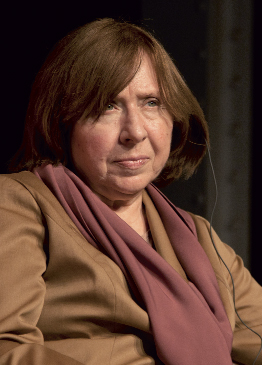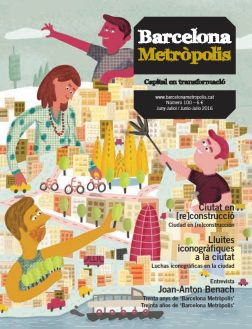 Svetlána Alexiévich’s stories remind us of the need to talk about what we are most familiar with, whether that is Barcelona or the Soviet Union, the women and children the Belarusian writer has interviewed for her books or the people going down the Via Laietana.
Svetlána Alexiévich’s stories remind us of the need to talk about what we are most familiar with, whether that is Barcelona or the Soviet Union, the women and children the Belarusian writer has interviewed for her books or the people going down the Via Laietana.
From Minsk to Barcelona. Literary contrasts are always positive, which is why we were so eagerly awaiting the visit from Svetlána Alexiévich last May. This is one of the ways in which cities can create links with one another, sending each other messengers, writers and stories.
Alexiévich walks slowly, tired from the dozens of interviews that now demand the same from her as what she asked of her informants. But it is also the slow walk of someone who has reached where they wanted to be, the gentle walk of someone who knows that they have done the job they had to do. She has written and published five books that have won a prominent place in the history of literature; perhaps that is why she now has time to be captivated by postcard stands. The mosaic dragons and curved façades contrast with the architecture appearing in her books. During her stay in Barcelona, she did one interview after another, just like she has done every day since they called her to tell her she had won a Nobel Prize. Her books provoke a thousand questions; there are shocking stories that shock in a thousand different ways. The questions raise themselves; comments and ideas emerge everywhere. There are very few literary projects that have the scope and responsibility that have been imposed, perhaps unwittingly, by Svetlána Alexiévich.
The journalism they say is dead…
The journalists ask her about her books. I feel like asking her about journalism, about the journalism they say is dead, that they say is finished. “Who says that?” she asks me. “Some journalists,” I answer. “Bah…” she replies, making a gesture with her hand. And I think that she is right, that it is easy to talk about the end of this profession when it is armchair journalism. But to someone who has done more than 700 interviews to piece together Chernobyl Prayer, that all sounds a bit strange. What is finished is journalism that has ceased to be journalism, and that might be a good thing. What is a shame is that it has lasted so long.
The Nobel Prize has made her known around the world and thrust a dagger into the heart of the publishing industry. At a time when stories are becoming uniform (remember what the industry and agents demand: a 300-page love story set in different countries), Alexiévich explains a local world to us, a particular world, and we could almost say that this strange but current idea called national literature is once again a good one. Set against lightness, frivolity and the dissolution of identities: literature, once again.
Alexiévich’s stories, in contrast, remind us of the need to talk about what we are most familiar with, about Barcelona or the fall of the Soviet Union, the women and children she interviewed for War’s Unwomanly Face and for The Last Witnesses, or the people going down the Via Laietana. Literature is always just a few steps from where we are, which is maybe why the writer’s first job is to be familiar with their closest surroundings. Maybe that is why she is enthralled by the postcard stands and, despite the tiredness and distance that is usually kept in these cases, from Minsk to Barcelona, she does not stop asking questions.
We were lucky. During these days, Alexiévich was able to share with us the details of how she constructed books that exude humanity, that talk to us about the need for and the importance of testimony and of the everyday for understanding history, power and politics. We have been able to translate these personal and polyphonic accounts from Russian to Catalan; we have read them, but the question that must be asked now is whether we can learn something from the distance that separates us. Reading, in essence, is just that: covering the space that separates us from the girls who enlisted voluntarily to go to the front during the Second World War, from those affected by the radiation in Chernobyl or, simply, from the people who one day saw how their country was disappearing. Because, beyond the mythomania of seeing the writer, what really matters to us is everything she has written, what the thousands of people she has interviewed over the years have told us.
Alexiévich is from Minsk, but her books are in the bookshops. The publishers have made a huge effort to put them within our reach. Let’s read them.



